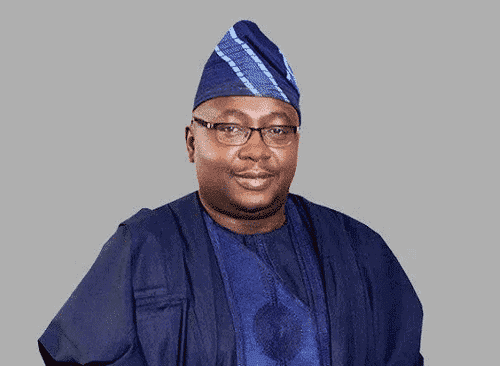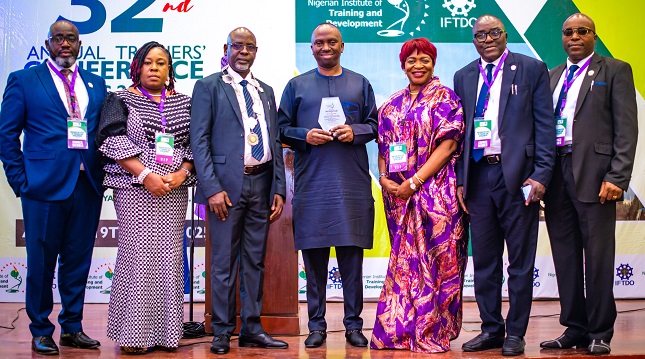News
NAICOM Boss Urges Operators to Strategise for Effective Management of N14tn Annuity Premium

Mr. Sunday Thomas, the commissioner for Insurance, has charged insurance industry operators to strategies on how best to effectively manage the existing N14 trillion pension assets, which will through life annuity plan be transferred to insurers as annuity premium by pension fund operators.

Thomas, who stated this in Lagos during a visit to Mutual Benefit Assurance Plc retail office, said time has come for insurance to take its rightful place in the scheme of things in the economy.
He charged insurance operators to brace up to the challenge of effective management of stream of premium that will flow into the industry especially through annuity plan as stated by the law.
The Pension Reform Act 2014, which established the on-going Contributory Pension Scheme (CPS) says that at retirement, a contributor into the scheme is at liberty to continue receiving the remaining part of his contributed fund after the initial lump sum pay on monthly basis from his Pension Fund Administrator (PFA) under programme withdrawal for 18 years or purchase life annuity from a licensed life insurance company to whom the retiree’s pension fund manager transfers the fund to and who takes over payment of Benefit to him for life.
Initially, contributors into CPS were confused on the choice to make between annuity plan and programme withdrawal but with time, majority now prefer buying life annuity which has the advantage of paying benefits to them for life instead of 18 years.
This means that the pension assets belonging to this greater number of contributors will automatically be transferred to life insurers as annuity fund.
Speaking to the retail insurance marketers and management of Mutual Benefit Assurance Plc, he said insurance business in Nigeria is no longer business as usual and that days were gone when insurance was described as poor cousin of the bank.
He said even before now, the above statement was misconception of what insurance does pointing out that most of the assets used today in Abuja was insurance fund.
“Before now, insurance was owned by banks but now it is not like that. Insurance firms own some banks and more banks will be taken over by insurance firms. Even some of the monumental assets in Abuja is owned by insurance industry look at Nicon Hilton, Sheraton Hotel, all were built with insurance funds. Abuja itself was built by insurance money and without insurance, Abuja wouldn’t have come to be,” Thomas stated.
The insurance commissioner said the N14 trillion pension fund will be emptied into insurance treasury as annuity fund to be managed by insurers adding that insurance managers have been assigned the responsibility of managing the fund by the regulation that established the prevailing Contributory Pension Scheme.
He said this is in addition to the existing N500 billion annual premium income in their coffers.
Section 4, subsection one of insurance Act 2014 on contributors’ retirement benefits says “A holder of a retirement savings account upon retirement or attaining the age of 50 years, whichever is later, shall utilise the balance standing to the credit of his retirement savings account for the following benefits-
“programmed monthly or quarterly withdrawals calculated on the basis of an expected life span; annuity for life purchased from a life insurance company licensed by the National Insurance Commission with monthly or quarterly payments; and a lump sum from the balance standing to the credit of his retirement savings account, Provided that the amount left after that lump sum withdrawal shall be sufficient to procure an annuity or fund programmed withdrawals that will produce an amount not less than 50 percent of his annual remuneration as at the date of his retirement.”
Initially, insurance and pension fund managers had clash over sale and management of the annuity fund but later came up with a document they tagged Revised Regulation on Retiree Life Annuity Pursuant to the Pension Reform Act 2014 Jointly Issued by the National Insurance Commission and National Pension Commission (NAICOM).
News
AfDB, Aerosense Ink Agreement to Propel Drone Adoption in Africa

The African Development Bank (AfDB) and Aerosense Inc, a Japanese drone manufacturer, have inked an agreement to expand cooperation and initiatives in drone technology in Africa.

According to the AfDB, representatives from both organisations signed a Letter of Intent late last week on the sidelines of the ninth Tokyo International Conference on African Development in Yokohama, Japan.
The agreement was signed by Solomon Quaynor, AfDB’s vice president for private sector, infrastructure, and industrialisation, and Kohtaro Sabe, Aerosense’s president and CEO.
In June, the AfDB Sustainable Road Maintenance Program for Africa issued a request for proposals, and the company was chosen.
The agreement formalises a relationship of mutual cooperation, assistance, information and knowledge sharing between the two institutions, as well as the exploration of co-financing and deal opportunities and appropriate coordination of actions between them and their respective teams, with a focus on the promotion of sustainable infrastructure solutions in Africa, according to the bank.
In addition, the AfDB will assist collaboration with the public sector, lead awareness-raising initiatives, support capacity building for local partners, and investigate potential debt (and/or equity) financing support for drone deployment projects.
Aerosense will conduct demand studies for drone solutions in specific African markets, as well as technical feasibility studies for drone application, taking into account local geographical factors, and investigate potential deployment options based on positive feasibility study results.
“The program is a bold response to Africa’s growing infrastructure challenges. By partnering with Aerosense, we will not only promote efficient road management but also consider promoting other unique solutions such as disaster management, river/flooding control, agricultural sensing, and medical equipment delivery,” said Quaynor.
For Sabe, the project is about leveraging multinational technological solutions to address African challenges.
He said: “It is a great honour to serve the people in Africa with our Japanese technology for enhancing their quality of life. We are looking forward to collaborating with AfDB to build a better future together in a concrete manner.”
News
Nigeria Taps $190M JICA Loan to Power Underserved Communities

Nigeria is seeking a $190 million renewable energy loan backed by the Japan International Cooperation Agency (JICA), according to Adebayo Adelabu, minister of power.

Minister Adebayo-Adelabu
In a statement released by the ministry on Saturday, Adelabu disclosed the plan during the 9th Tokyo International Conference on African Development (TICAD 9) in Yokohama, Japan, where the Nigerian delegation led by President Bola Tinubu held high-level discussions on power, infrastructure, and industrial transformation.
Adelabu said the facility is aimed at scaling distributed renewable energy solutions across underserved communities. “This builds on the recently launched $750 million World Bank Distributed Access through Renewable Energy Scale-up (DARES) programme under the Mission 300 Compact, which aims to bring clean and reliable electricity to more than 17 million Nigerians,” the ministry said.
The minister also held talks with Japanese corporations including Toshiba, Hitachi, Japan’s transmission and distribution corporation, and energy exchange corporations. Discussions focused on strengthening transmission infrastructure, improving operational efficiency, and cutting system losses.
The ministry said these engagements build on recent Federal Executive Council approvals for counterpart funding of N19.08 billion to unlock a $238 million loan from JICA. The loan will finance the expansion of the national grid, including the construction of over 200km of new 330kV and 132kV double circuit lines, six new substations, and extensions to existing facilities.
Three substations funded through a $32 million JICA grant—located in Apo (FCT), Keffi (Nasarawa), and Apapa (Lagos)—are also set for commissioning, a move expected to boost supply reliability for households, industries, and business hubs, including the Lagos Port.
Speaking during a panel session themed “HICKARE Africa: Harnessing Innovation, Co-creation, and Knowledge for Accessible and Resilient Energy for Africa”, Adelabu highlighted Nigeria’s energy gap, noting that only 55–60 percent of the population currently has access to electricity, much of which is unreliable.
He outlined the government’s approach to expand grid access in urban areas while accelerating off-grid solutions such as solar mini-grids and standalone systems in rural and peri-urban communities. He pointed to challenges including limited access to affordable capital, high costs for rural households, and the under-utilisation of productive-use equipment.
Despite these hurdles, the minister reaffirmed the government’s commitment to reforms through supportive policies, private-sector collaboration, and increased local manufacturing of renewable energy components.
Adelabu commended JICA and the Japanese government for their “long-standing support” to Nigeria’s power sector, praising their contributions to infrastructure, training, technical studies, and financing. He expressed optimism for deeper partnerships between both countries in driving Nigeria’s energy transition.
News
Banigbe, T2 CEO says Nigeria’s Growth Hinges on Learning, Innovation, and Afrocentric Content

Obafemi Banigbe, chief executive officer of T2, has stressed that Nigeria’s long-term economic transformation depends on continuous upskilling, digital learning, and workforce adaptability.

Speaking as Special Guest at the 32nd Annual Trainers’ Conference (ATC 2025) of the Nigerian Institute of Training and Development (NITAD), held recently at the Shehu Musa Yar’Adua Centre, Abuja, Banigbe warned that without deliberate investment in human capital and technology-driven innovation, the nation risks lagging behind in a rapidly evolving global economy.
Drawing from personal reflections, practical insights, and a forward-looking vision, Banigbe urged Nigerians to reimagine approaches to learning, work, and growth in order to build a prosperous, inclusive, and innovation-led society.
He emphasized that the traditional model of “learning once and working forever” is obsolete.
“With Nigeria projected to become the world’s third most populous nation by 2050, and 70 percent of its citizens under 30, the need for continuous upskilling, digital learning, and adaptability is not optional, it is existential,” he stated.
Banigbe underscored the importance of democratizing access to digital tools, ensuring that every Nigerian child has the same opportunities as peers in developed economies.
He called for the creation of Afrocentric educational content, including culturally relevant cartoons, to help children learn science, mathematics, and history through familiar cultural references rather than foreign identities that disconnect them from their environment.
He also urged a national shift away from a culture that prizes certificates and training hours to one that rewards competence, innovation, and problem-solving.
He envisioned a civil service and workforce driven by solutions rather than processes, stressing that while artificial intelligence may analyze and automate, it cannot dream, uphold ethics, or create new nations, a reminder of the enduring human advantage.
Banigbe further encouraged adoption of cost-effective training models such as online platforms, virtual cohorts, and open-source learning, while acknowledging the continued value of global exposure where local resources fall short.
During an interactive question and answer session, he addressed concerns around affordability, accessibility, and the role of self-driven digital education in shaping Nigeria’s future-ready workforce.
He assured participants that T2 itself is on a path of transformation, committed to delivering world-class services as a proudly Nigerian brand.
In recognition of his contribution to national dialogue and thought leadership, the President of NITAD, James Bulus, presented Banigbe with an Award of Excellence.

 E-Financial3 days ago
E-Financial3 days agoFBNQuest Merchant Bank Facilitates Landmark ₦5Bn Commercial Paper Programme for Accion Microfinance Bank

 E-Business3 days ago
E-Business3 days agoNDPC Begins Probe of Banks, Others for Data Breaches

 Telecom3 days ago
Telecom3 days agoDigital Realty Commits to Africa’s Digital Transformation @ Launch of LKK2 Data Center

 E-Financial3 days ago
E-Financial3 days agoUBA to Deepen Financial Inclusion, Boost Savings’ Culture with Super Savers’ Promo

 Telecom3 days ago
Telecom3 days agoIntel–U.S. Partnership Reshapes Semiconductor Landscape with Historic Equity Agreement

 E-Financial3 days ago
E-Financial3 days agoFidelity Bank Resumes Intl Transactions on Naira Debit Cards

 E-Financial3 days ago
E-Financial3 days agoNigeria Leads Africa in Stablecoin Adoption with $22Bn in Transactions

 Telecom3 days ago
Telecom3 days agoNITDA Alerts Nigerians to eSIM Security Flaw Deployed to Hijack Devices Worldwide
























